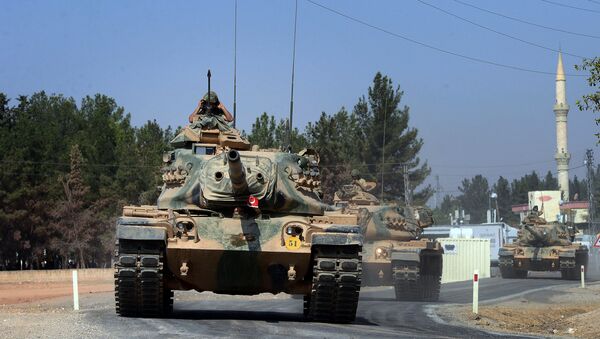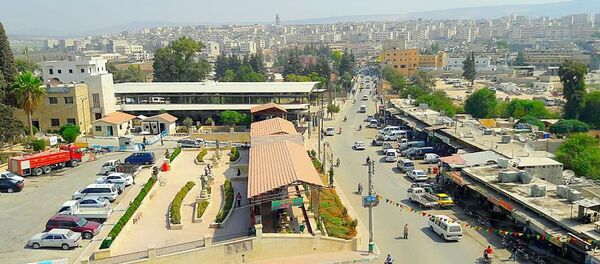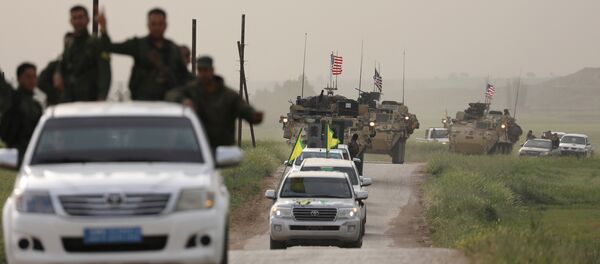On January 19 Ankara signaled that its military operation against the Syrian Kurdish enclave in Afrin to thwart the security threat posed by Kurdish militias has "de facto" started. While tensions continue to mount in northern Syria, the question arises: What do the Turks actually want?
Sputnik got in touch with Canada-based political analyst Oussama El-Mohtar asking him to comment on the issue. According to the scholar, Ankara's aspirations go far beyond ensuring security of the country's borders.
"Turkey is looking for a new sphere of influence in terms of resources and markets," the political analyst emphasized. "That sphere could only be in the Middle Eastern Fertile Crescent [the region which curves through Iraq, Syria, Lebanon, Jordan, Israel, Palestine]. It will be looking to acquire new resource rich territories from Syria and Iraq, and to exert new influence in Lebanon and occupied Palestine. But in this quest, it is going to be shaking the existing regional and international balance, and this is risky business."
How US, EU Disappointed Turkey's Aspirations
For instance, Washington not only failed to deliver on its promise to Ankara not to arm the Kurds but continues to send mixed signals to the Turkish leadership on the alleged creation of the "border force" in the regions held by the Kurdish-dominated Syrian Democratic Forces (SDF) in Syria.
"Anyone who relies on American promises needs to hang on his wall a picture of the last American helicopter flying out of the US embassy in Saigon," El-Mohtar remarked wittily.
According to the scholar, "Turkey has come to realize two things: one that it will not be accepted in the European Union, especially after French president Macron declared on January 5, 2018, that 'the current process does not allow for an outcome in the coming years'."
He referred to Erdogan's tough remark that "frustration over the EU stance might tempt Ankara to turn its back on Europe." "This is the key statement: 'turn its back,' but go where?" El-Mohtar asked.
"The second realization, in light of the failed coup d'etat against Erdogan, and the ambiguous role attributed to the Americans in it, was that the Americans cannot be trusted," the scholar continued.
The Future of Turkey's NATO Membership Depends on US, EU Interests
As for Turkey's future within NATO, he believes that "it is quite possible that Turkey and the European Union and the US are evaluating this role, each from its own perspective and based on its own interest."
The Kurdish People's Protection Units (YPG) — the vanguard of the SDF — is seen by Ankara as an affiliate of the Kurdistan Workers' Party (PKK) outlawed in Turkey.
"The Turks — not only Erdogan, but all political stripes — view a Kurdish State at their southern border as an existential threat," the political analyst explained. "A quick look at any of the proposed Kurdish State's maps reveals that they all include, through varying degrees, the sources of the big rivers, the Euphrates and the Tigris currently within Turkish borders. But they also include large swaths of land from Syria, Iraq and Iran. These states do not view a Kurdish State with less alarm than Turkey."

Turkish President Erdogan is Not Bluffing
Earlier Turkish President Recep Tayyip Erdogan threatened to nip the much-discussed "border force" in the bud, citing to the preparations for large-scale military operations in Afrin and Manbij.
"I don't think that Turkey is bluffing, and will go to war if pushed," the political analyst stressed.
The January 19 reports that the Free Syrian Army's (FSA) had crossed the Syrian border and is moving towards Azaz appear to confirm El-Mohtar's assumption.
The political analyst pointed out that one shouldn't forget that Turkey after its defeat in WWI opened several fronts against the European powers from Armenia to Greece. The Turks forces their adversaries "not only to give up what they had carved from Turkey according the treaty of Sevres, 1920, but they expanded their borders south into Syria and Iraq and forced recognition thereof at the Lausanne, 1923 conference."
"If we stay with the basic premise that Turkey is looking to compensate its losses in Europe through acquiring new spheres of influence and control in the Syrian Fertile Crescent, it will be looking at controlling Afrin and Manbij for immediate compensation," the scholar suggested. "If this works, it could be looking for annexing them along the same lines as the annexation of Iskenderun and other Syrian lands in the last century."
In this case Turkey would have a free hand in northern Syria, while Kurdish aspirations will be "placed on hold."
However, according to El-Mohtar it is not in Russia's interest "to see an empowered Turkey expanding into Syria and Iraq," especially given the Turkish leadership's role in "advancing ISIS's [Daesh] destructive activities" in these countries and Ankara's links to the Muslim Brotherhood.
The political analyst suggested that Russia and to lesser extent Iran, Syria and Iraq could prevent the potential conflict between Ankara and the US-backed Kurdish forces.
While Syria and Iraq are "exhausted," Russia is "on the rebound and is claiming its role as a super power," El-Mohtar stressed.
The views and opinions expressed by Oussama El-Mohtar, Ekaterina Blinova are those of the contributors and do not necessarily reflect those of Sputnik.







